Get A Quote
Guidelines for Implementation of IS 18112:2022 - Digital Television Receiver for Satellite Broadcast Transmission
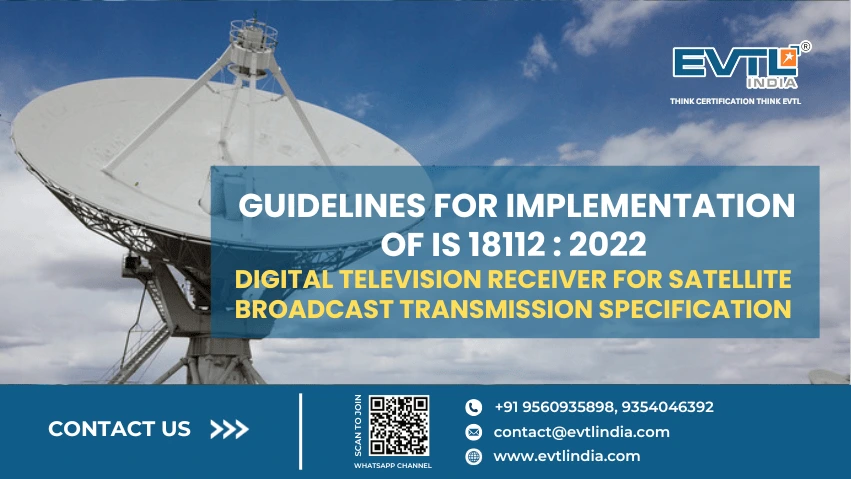
The Ministry of
Electronics and Information Technology (MeitY) has made it mandatory for all
television sets to comply with the new specifications outlined in IS 18112:2022, focusing on Digital
Television Receivers for Satellite Broadcast Transmission. This standard
ensures that televisions sold in India are capable of receiving digital
satellite Free-To-Air (FTA) TV and Radio signals. Here’s a detailed breakdown
of what this new regulation entails and how manufacturers and stakeholders can
prepare.
What
is IS 18112:2022?
The IS 18112:2022 standard specifies the
requirements for Digital Television
(DTV) receivers to ensure compatibility with digital satellite Free-To-Air
(FTA) TV and Radio transmissions. This means that all televisions must be
equipped to handle these signals to provide enhanced viewing experiences for
consumers, including clearer picture quality and a broader range of channels
without the need for a set-top box.
Why
is IS 18112:2022 Important?
With the rise in
digital content and satellite TV transmission, the Indian government aims to standardize
the capabilities of television sets to ensure they are future-ready. By implementing this standard, the government aims
to:
● Ensure that all TV sets are
equipped to receive Free-To-Air satellite broadcasts.
● Enhance consumer experience
with better accessibility to digital content.
● Align Indian standards with
global requirements, ensuring quality and compatibility.
Key
Implementation Guidelines for IS 18112:2022
Here’s what
manufacturers and stakeholders need to know about the new guidelines:
1. Mandatory
Compliance for Digital TV Receivers
MeitY, through an
Order dated 26 April 2023, mandated that the requirements for Digital Television Receivers for Satellite
Broadcast Transmission under IS
18112:2022 must be followed. The last date for compliance is 25 April 2025. Post this deadline, only
televisions meeting these standards will be allowed to carry the BIS Standard
Mark.
2. Existing
Licenses for Televisions
For manufacturers
already holding licenses under IS
616:2017/IEC 60065:2014, which covers safety requirements for Plasma, LCD,
and LED televisions:
● All existing TV sets must now
also comply with IS 18112:2022.
● Manufacturers need to apply for
an inclusion of the IS 18112:2022
specifications under their existing licenses.
●This can be done following the
‘Guidelines for Change in Scope of Licence (CSoL)’ under Scheme II of the BIS
(Conformity Assessment) Regulations, 2018.
3. Timeline
for Compliance
The transition is
time-bound, with specific deadlines:
● 25 April 2025: The final deadline for
compliance. After this date, TV models that only comply with IS 616:2017/IEC 60065:2014 will be
removed from the scope of the existing license.
● Manufacturers who fail to
update their licenses with the new requirements by this date may face license
cancellation.
● 25 March 2025: This is the last date to
process applications under the old guidelines before the final implementation
of IS 18112:2022.
4. New
Applications for License
For manufacturers
seeking a new license for Plasma, LCD, or LED TVs, the process will include
compliance with both:
● IS 616:2017/IEC 60065:2014 for safety
requirements.
● IS 18112:2022 for Digital TV receiver
specifications.
This requires
submitting a new application as per the ‘Guidelines for Grant of Licence (GoL)’
under Scheme II of the BIS (Conformity Assessment) Regulations, 2018.
Application
Handling and License Scope
The new guidelines
outline a detailed process for managing applications and inclusions:
- Pending Applications: Applications submitted under IS 616:2017/IEC 60065:2014 will be accepted only until 25 March 2025. If these
applications do not comply with the additional IS 18112 requirements by 25
April 2025, the models will face cancellation.
- Inclusions in
Existing Licenses: Any inclusion requests for IS 616:2017/IEC 60065:2014 will
also only be accepted until 25 March 2025. Post-deadline, all pending
inclusion requests that do not comply with IS 18112 will be automatically rejected.
- New
and Existing Models: Post 25 April 2025, any television model must incorporate both
standards to be legally available in the Indian market.
Labeling
and Standard Mark
To simplify the
identification of compliant TV sets:
● The BIS Standard Mark will
cover compliance with both IS
616:2017/IEC 60065:2014 and IS
18112:2022.
● A single license number will be
displayed below the Standard Mark, covering both standards.
● This ensures clarity for
consumers, who can easily verify that a TV set meets both safety and digital
satellite broadcast requirements.
What
Manufacturers Need to Do
To ensure
compliance with the new standards, manufacturers should:
- Review Existing
Licenses: Ensure that all models meet the
safety requirements of IS
616:2017/IEC 60065:2014 and the new digital reception standards of IS 18112:2022.
- Apply for Inclusion: If you are an existing licensee, submit an inclusion request
to cover the new standards by following the ‘Change in Scope of Licence
(CSoL)’ guidelines.
- Prepare for New
Applications: If you plan to introduce new
models, ensure your application covers both standards from the outset.
- Monitor
Deadlines: Adhere to key dates to avoid
license cancellations or rejections.
Conclusion
The implementation
of IS 18112:2022 is a major step in
modernizing television standards in India, ensuring a better viewing experience
for consumers while aligning Indian products with global norms. Manufacturers
have ample time until 25 April 2025
to adjust and ensure compliance, but early preparation is recommended to avoid
last-minute challenges. This initiative marks a new era of digital content
accessibility and safety, contributing to the overall improvement of India's
consumer electronics sector.
For more detailed
information, manufacturers and stakeholders are advised to refer to the Conformity Assessment Scheme II of the BIS
(Conformity Assessment) Regulations, 2018, and stay updated with guidelines
from MeitY and BIS.
You can contact us via email at contact@evtlindia.com or by phone at 9560935898. Feel free to get in touch with us anytime for the support you need.
BIS ISI Mark Certification | BIS-CRS Certification | EPR E-WASTE | WMI Registration | BIS Certification For Footwear | TAC & IMEI Registration | BIS FMCS Page | TEC | EPR Registration for Plastic Waste Management | EPR Registration for Battery Waste Management | EPR Registration For Used Oil | EPR Registration for Tyre Waste Management | WPC ETA License | NOC | LMPC | Legal Metrology | Trademark Registration | ISO Certification | EMI-EMC Test | Toys | GEM Registration | EPCG Scheme | LM 79 & LM 80 | ROHS Approval | CDSCO Registration | RF Testing | IP Rating Test | MSME & NSIC Registration | BIS Certificate for Conformity | BIS Scheme-X Certification | Hallmark Registration | Laboratory Recognition Scheme | ECO-MARK Certification | RDSO | CE Certification | List Of Equipments | US FDA Registration | Lab Setup & Lab Equipment |
Recent Posts
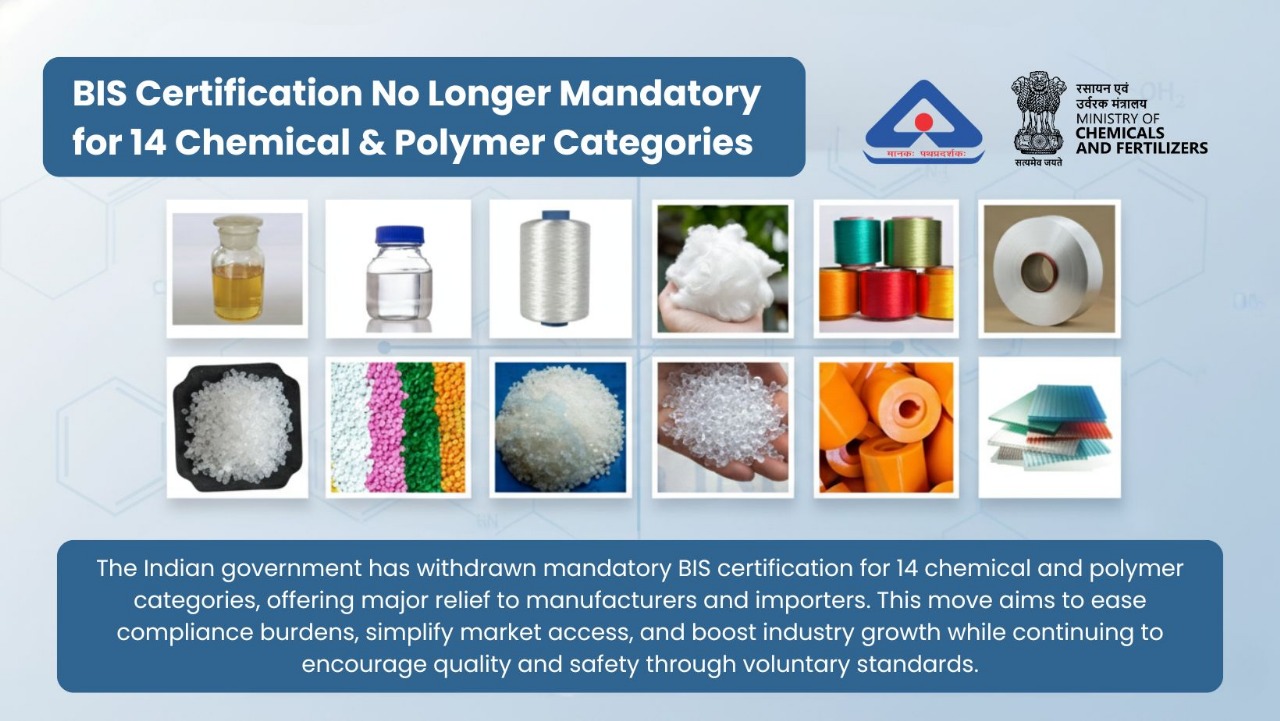
BIS Certification No Longer Mandatory for 14 Chemical & Polymer Categories
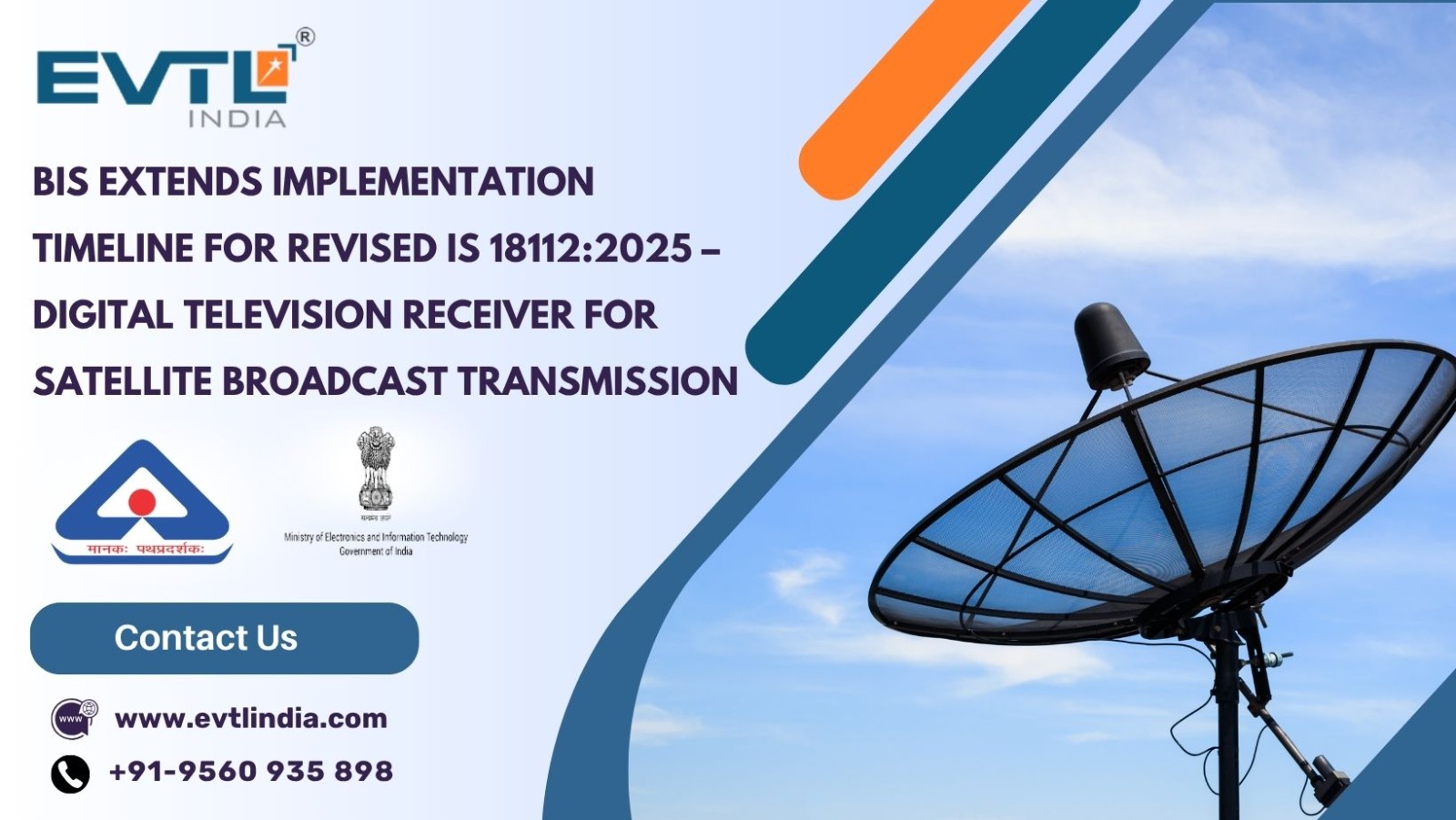
BIS Extends Implementation Deadline for Revised IS 18112:2025 – Digital Television Receivers for Satellite Broadcast Transmission
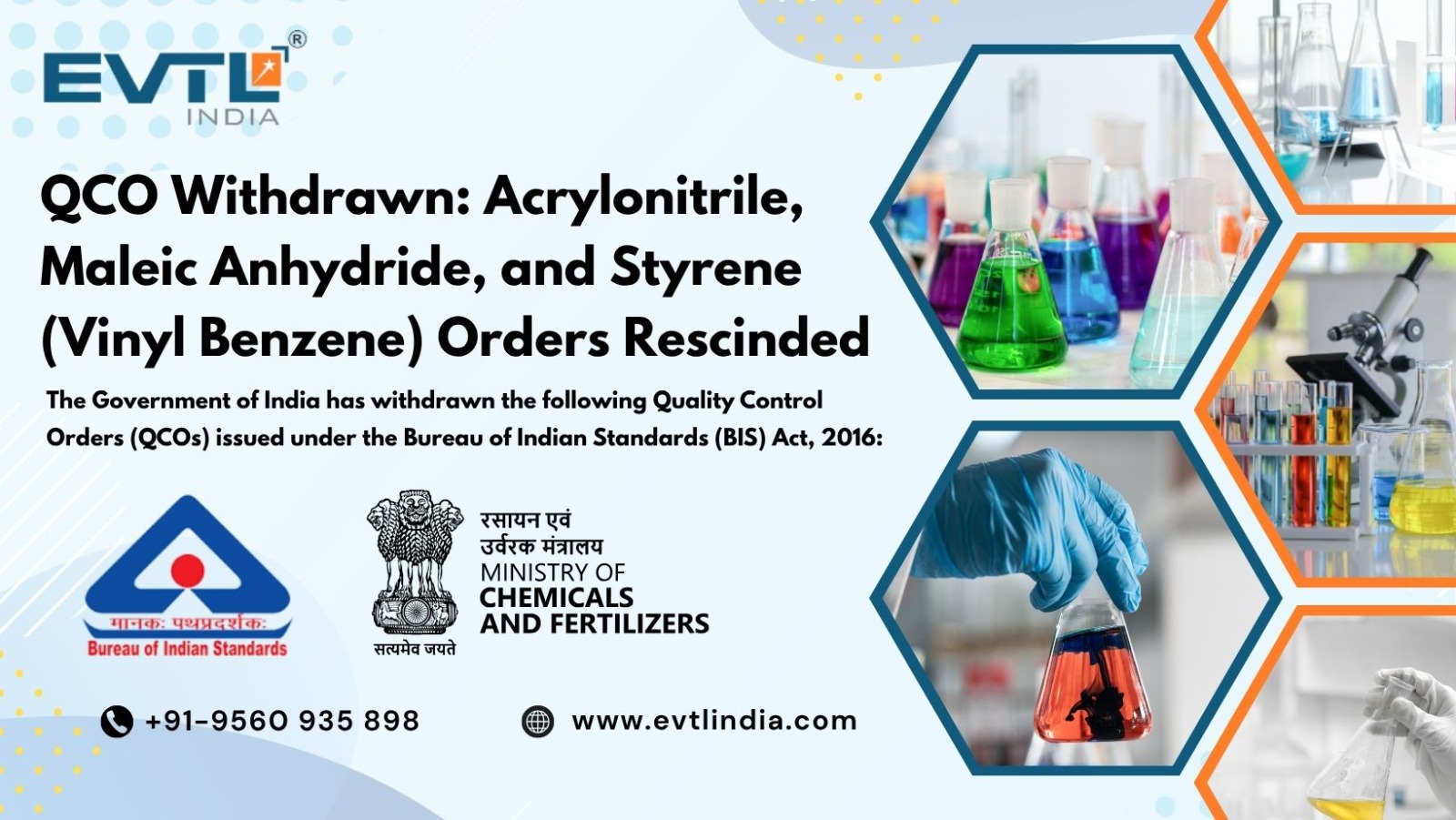
Government Withdraws Quality Control Orders for Six Chemicals – BIS Certification No Longer Mandatory
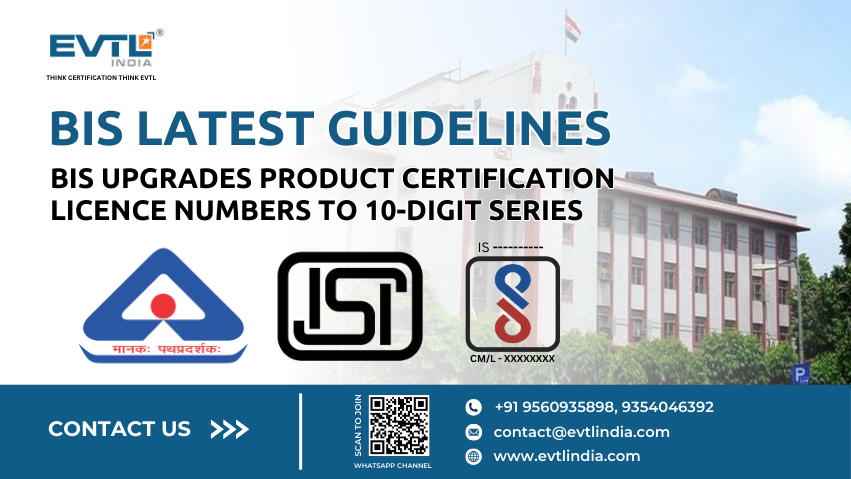
BIS Upgrades Product Certification License Numbers to 10-Digit Series
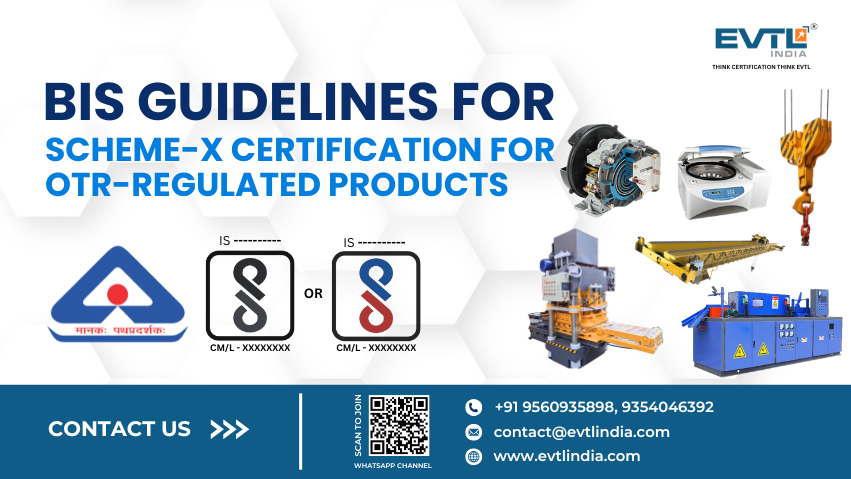
BIS Guidelines for Scheme-X Certification for OTR-Regulated Products
Free Call Back
Why Choose EVTL INDIA
Expertise in Indian Regulatory Standards
End-to-End Support
Trusted by Top Indian & Global Brands
Fast Processing & Transparent Pricing
Strong Liaison with Indian Authorities
Company Profile














